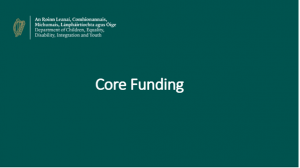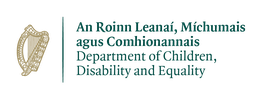
Core Funding is a payment to providers designed to support quality, sustainability, and enhanced public management, with associated conditions in relation to fee control and cost transparency, incorporating funding for administration and to support the employment of graduate staff.
Whats new for Partner Services in Core Funding Year 4 2025-26
For further information on the 2025/2026 Core Funding Programme Rules, please refer to Schedule 2: Core Funding Rules Document in the Core Funding Partner Service Funding Agreement 2025/2026
Core Funding Service Provider Year 3 Trial Balance (2024/2025) Frequently Asked Questions
The Service Provider Year 3 (2024/2025) FAQ is now available on the Core Funding Documents page of the Early Years Hive or download here: Core Funding Financial Reporting Requirements Service Provider FAQ Year 3
About the Core Funding Application
The Core Funding Application process is available to Early Learning and Care (ELC) and/or School Age Childcare (SAC) providers. Applicants will be required to define their service’s profile and their capacity in detail. This is a two-part process:
Part A (Service Profile); and Part B (Core Funding Application Module).
In part A, service level details and staff details are recorded. The staffed capacity detail and age ranges catered for, are captured at the room/session type level in part B.
Please refer to the Core Funding Applicant Guidelines 2025/2026 and How to complete your Core Funding Application Module video for more information.
When the Service Profile and Application Module are both completed, your service must then accept the Core Funding Partner Service Funding Agreement for the relevant programme year on the Early Years Hive. For information on the Core Funding Partner Service Funding Agreement, click here.
Core Funding Programme Readiness Checklist
Core Funding how-to training videos
Click on the links to view the training videos.
- Core Funding 2025/2026
Core Funding 2025/2026
Core Funding Financial Reporting Requirements Year 4 (2025/2026) Trial Balance
Submitting a Review and Confirm
A Core Funding Partner Service is required to Review and Confirm their Core Funding Application information a number of times within the programme year (August, November, February and May.)
The Review and Confirm window will open for a specific window throughout the programme year.
This process enables Core Funding payments to continue by facilitating Partner Services to confirm that no changes have occurred or to submit an application change. If a Partner Service does not complete the Review and Confirm process within the required timeframe, Core Funding payments will be placed on hold until such a time as the process is completed.
Only Applications/Application Changes at an Approved status can complete the Review & Confirm process.
If an application is at ‘Referred back’ Partner Services must edit their Core Funding Application Module/Application Change to address the reason(s) for refer-back. Once the application is approved, Partner Services must then proceed to complete the Review & Confirm form.
Please refer to the Core Funding Applicant Guidelines for more information.
Submitting a Quality and Inclusive Practice Plan (QIPP)
Core Funding supports Partner Services with their financial sustainability while enhancing the quality, affordability, and accessibility of their services. In accordance with Partnership for the Public Good, (DCEDIY 2021) the Core Funding model commits to drive high- quality service provision. To support this, Core Funding requires all early learning and care (ELC), school-age childcare (SAC) and childminding services that benefit from Core Funding to complete a Quality and Inclusive Practice Plan (QIPP) and an end of year QIPP Report, using tools provided by the Department.
- The Core Funding Quality and Inclusive Practice Plan (QIPP) Report Template 2025/26 is now open on the Core Funding Contractual Requirements Reporting System Portal https://www.cfcrrs.ie/.Progress can be documented and saved on an ongoing basis.The PAU (Primary Authorised User) or QAU (Quality Authorised User) can begin to document and save any progress that has been made toward achieving the actions as outlined in their QIP Plan. To do so log into the CFCRRS portal, open the QIP Plan submitted at the start of the programme year, begin to answer the reporting questions and save the document as you go.The deadline for completion of the 2025/26 QIPP Report is Friday 31st July 2026.Once complete the PAU or QAU can submit the report by selecting the green check mark at the top of the template. For step-by-step guidance see the Quality and Inclusive Practice Plan (QIPP) Annual Report Return Technical Guidance Video.
Should you require support getting started, if you experience technical difficulties, or at any stage of your Quality and Inclusive Practice Planning process please contact Sinead on 057 86 61029 or email s.brophy@laoischildcare.ie
Guidelines on Fee Management
Together for Better is the new funding model for Early Learning and Care and School Age Childcare. This Funding Model supports delivery of early learning and childcare for the public good, for quality and affordability for children, parents/guardians and families.
Under Together for Better, Core Funding, is a key pillar of funding to services that forms part of the new funding model as recommended by an Expert Group in their report, Partnership for the Public Good: A New Funding Model for Early Learning and Care and School-Age Childcare, and approved by Government in December 2021.
One of the key features of Core Funding is the introduction of a system of fee management, to ensure that affordability measures are passed on to parents/guardians. To achieve this, Core Funding introduced fee management for the 2022/2023 programme year. This fee management system has continued to operate in the 2023/2024 and 2024/2025 programme years.
All services that participate in Core Funding must operate their service in line with the terms and conditions outlined in the Core Funding Partner Service Funding Agreement.
- To participate in the Core Funding Partner Service Funding Agreement, you must:
- Have a submitted Core Funding Application Module.
- Contracted to the ECCE programme and/or contracted to NCS for the relevant programme year (unless the service is registered with Tusla as a Pre-school Sessional Service only)
- Enter into a Funding Agreement with the Department of Children, Disability and Equality (DCDE) in respect of Core Funding.
- You can view a copy of the Core Funding Partner Service Funding Agreement here.
In instances where a case of a potential breach of Core Funding fee conditions outlined in the Core Funding Partner Service Funding Agreement by a Partner Service is identified, this may be examined and a conclusion reached through the Core Funding Fee Review process. The first point of contact before any Fee Review Stage is initiated, is with your local CCC. If your local CCC receives a query where a potential fee increase is raised, they can get this examined through the Core Funding Fee Review Process.
Resources
The following resources provide specific detail on Fee Review Queries and the process of how such queries are managed:
- For fee review queries raised between May 2023 – November 2023 – Together for Better: Guidelines on Fee Management May 2023 – November 2023
- For programme year 2023/2024 queries raised between 1 December 2023 and 31 August 2024 – Together for Better: Guidelines on Fee Management December 2023 – August 2024
- For programme year 2024/2025 queries raised from 1 September 2024 onwards – Fee Review Process – Guidelines for 2024/2025 Programme Year
Outcome of Fee Review Process
If a determination is made at the conclusion of the fee review process that a breach of the Core Funding Partner Service Agreement or it associated Rules has occurred, a Partner Service may need to take remedial actions. This may include being asked to provide evidence of remediation of any breach of the Core Funding Partner Service Agreement to the National Fee Review Team (NRFT) within the allowed time period of 60 working days. Evidence of remediation may include the provision of evidence that demonstrates that a Partner Service has:
- Restored fees to the correct level.
- Informed and refunded all parents who have been overcharged the full amount that they have overpaid, or agreed a repayment plan with them.
- Updated the relevant Fee Table and Parent Statement for Partner Services on the HIVE,
- Post the updated Fee Table and Parent Statement in public locations on the premises, and emailed them to all parents/guardians.
Failure to provide evidence of remediation may result in the Minister terminating the Core Funding Partner Service Funding Agreement. Funding may remain suspended until such a time as a determination has been made and the Partner Service has provided a Declaration and supporting evidence to the Department and/or Scheme Administrator to demonstrate its compliance with the outcome of the Fee Review Process.


